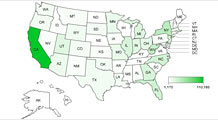Bernanke: Recovery to begin next year
Federal Reserve chairman says stabilizing the banking system will be key to a full economic recovery.
 |
| Federal Reserve chairman Ben Bernanke |
NEW YORK (CNNMoney.com) -- Federal Reserve Chairman Ben Bernanke said on Sunday that government officials are laying the groundwork for an economic revival and that a "depression" can be avoided - acknowledging however that a full recovery will take time and that there are still obstacles.
"We're working on it. And I do think that we will get it stabilized, and we'll see the recession coming to an end probably this year. We'll see recovery beginning next year. And it will pick up steam over time," Bernanke said in a rare public interview airing on "60 Minutes," according to a transcript released by CBS.
When asked about the risks of a "new American depression," Bernanke responded, "I think we've averted that risk. I think we've gotten past that."
Key to a full recovery, said Bernanke, is stabilization of the banking system -- an argument the Fed chairman has made repeatedly.
Bernanke also defended government actions taken thus far, as well as the decision last fall to let Wall Street firm Lehman Brothers fail while at the same time stepping in to save insurance giant American International Group.
Bernanke said the Fed did not have powers to save Lehman because the firm did not have sufficient assets to post as collateral. In contrast, AIG (AIG, Fortune 500) has vast insurance operations that it can sell off to repay government loans.
AIG has since received $170 billion in bailout funds, in part to cover its obligations to banks worldwide. These banks had taken out insurance from AIG against the default of risky bonds. AIG collected hefty premiums from those contracts, but did not have sufficient reserves to pay out claims.
Though Bernanke said he understands public outrage over using taxpayer dollars to prop up AIG, which made "unconscionable bets," he thinks the government had little choice.
"At that period, I felt we were pretty close to a global financial meltdown," Bernanke said.
Bernanke indicated that similar decisions may be necessary with other big financial institutions, which are now undergoing "stress tests" to evaluate their ability to withstand extreme financial shocks.
He made clear he would seek to avoid massive bank failures - but not that he would seek to prop up sick banks indefinitely.
"They are not going to fail. But what we can do, should it be necessary, is try to wind it down in a safe way. So, for example, in the case of AIG, we've prevented a bankruptcy, because of the chaos that would create. But we're also demanding that AIG divest itself, sell off its - subsidiaries, and use the proceeds to pay back the government."
Bernanke, from a modest background in Dillon, S.C., said his chief aim in focusing on the financial sector is to ultimately help the economy at large. "I've never been on Wall Street. And I care about Wall Street for one reason and one reason only - because what happens on Wall Street matters to Main Street."
Meanwhile, Bernanke indicated some government efforts are already paying off, seen in lower mortgage rates, stable money-market funds and more business lending.
The interview comes at a fragile time for the U.S. economy. Though the U.S. stock market soared 10% in the past week and several economic readings showed some firming, there still is no shortage of anxiety.
At issue: It is still unclear how the financial sector bailout strategy will address the problems caused by mortgages weighing down bank balance sheets. There is also concern about the nation's debt burden because of the $787 billion economic stimulus package enacted last month and other federal spending programs. And job losses and foreclosures continue to mount.
Still, Bernanke sought to look past these immediate problems. "I just have every confidence that as we get through this crisis, that our economy will begin to grow again, and it will remain the most powerful and dynamic economy in the world." ![]()


